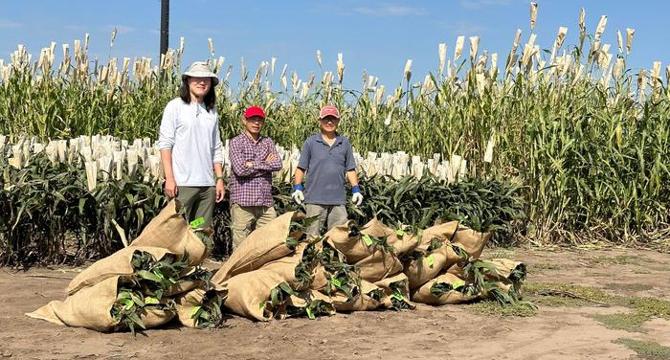Bioengineer
6d
66

Image Credit: Bioengineer
From Laboratory to Agriculture: CABBI’s Pipeline Produces Oil-Enriched Sorghum
- Research at the Center for Advanced Bioenergy and Bioproducts Innovation (CABBI) has innovated a sorghum variant that triumphs over traditional soybeans in capabilities to produce oil. The variant is a promising possibility for clean, renewable fuels, representing the potential to revolutionize the biofuels sector. By rethinking the agricultural approach to oil production, CABBI scientists have tapped into the need for alternative feedstocks that can effectively address future energy challenges.
- Researchers are engineering high-biomass grasses, like the newly developed sorghum variant, to effectively produce oil. Sorghum includes high biomass yield, excellent photosynthetic efficiency, and adaptability to harsh climates, making it an optimal candidate for future bioenergy applications.
- The engineered variant displays remarkable TAG accumulation—up to 5.5% dry weight in leaves and 3.5% in stems. The engineered sorghum could generate approximately 1.4 times more oil per hectare compared to soybeans, providing an effective feedstock alternative for renewable fuel production.
- The development could uncover new markets and income streams for farmers, furthering economic growth alongside the move toward renewable energy and sustainability.
- The team will conduct comprehensive analyses of metabolic outcomes, using cutting-edge techniques such as whole transcriptome shotgun sequencing. Through the extensive analysis, scientists discovered that their engineered oil sorghum lines exhibited increased production of enzymes that degrade lipids, including TAG.
- The pioneering efforts of the CABBI team spotlight the vital intersection of biotechnology, energy needs, and agricultural advancement. Advancements in crops like this sorghum variant may represent an essential stepping stone in the transition towards a sustainable energy future.
- Bio-processing of oil extracted from sorghum might open avenues to invigorate rural economies and stimulate interest in sustainable agricultural practices.
- Utilizing advanced gene transfer techniques, the CABBI team successfully engineered sorghum lines that showed stable oil production over multiple generations. The remarkable stability illustrates the long-term viability and sustainability of biomass-derived energy sources produced from these sorghum lines.
- Scientists remain dedicated to the ongoing exploration of bioenergy solutions that marry environmental health with economic resilience, ensuring that the agricultural sector plays a prominent role in achieving global sustainability goals.
- In summary, this pioneering development could represent a crucial bridge between the present and future of biofuels. The engineered oil sorghum may contribute meaningfully to the bioeconomy while supporting rural livelihoods.
Read Full Article
3 Likes
For uninterrupted reading, download the app